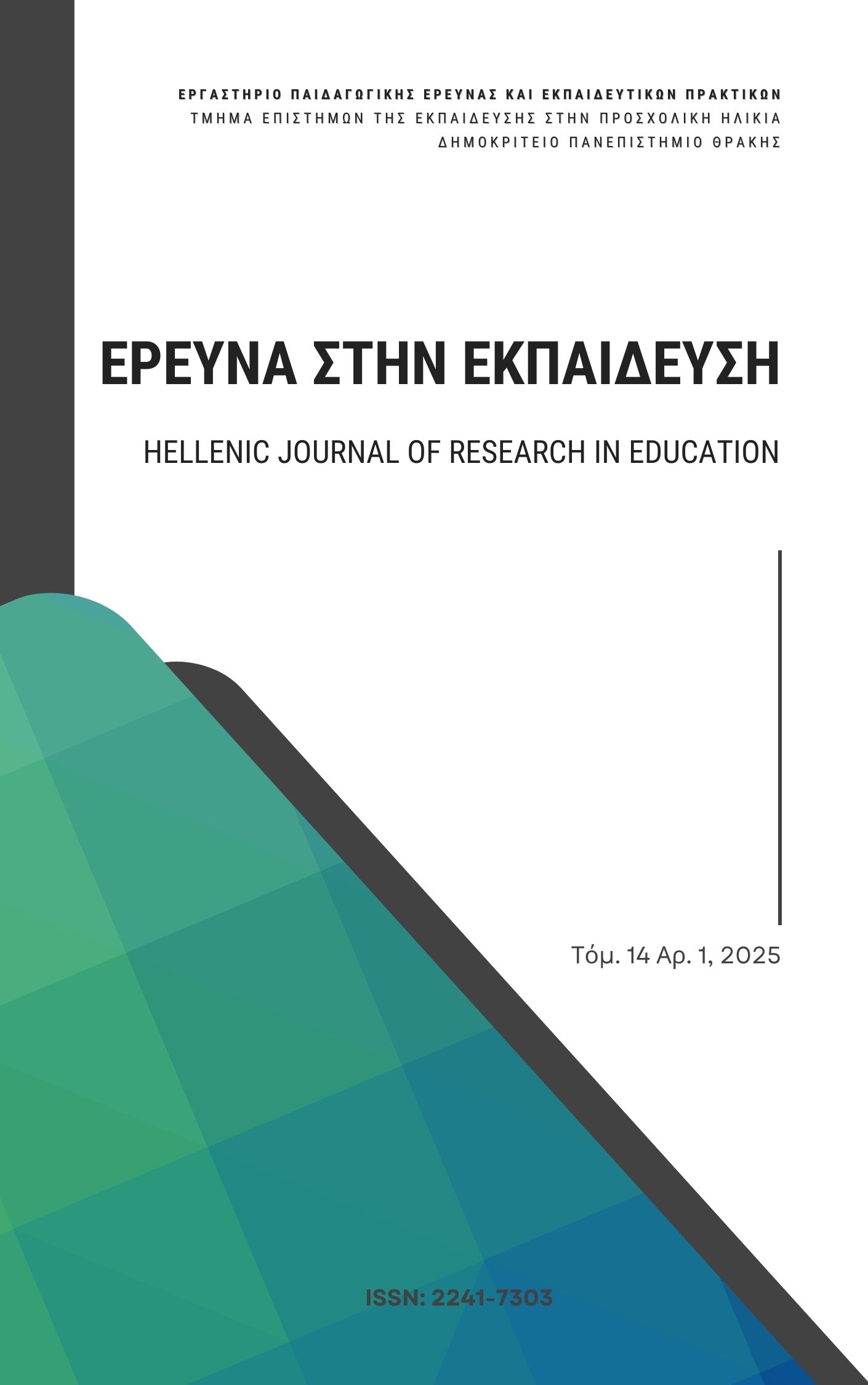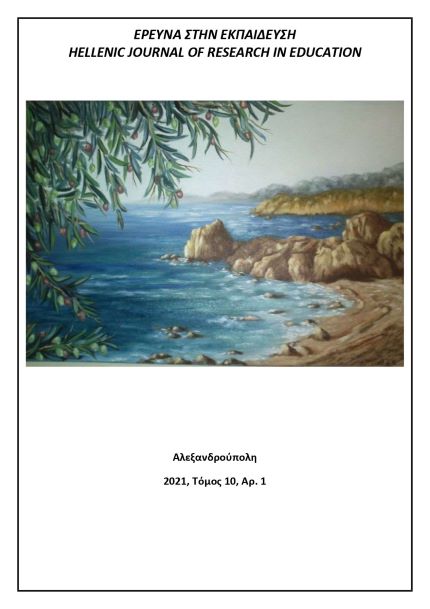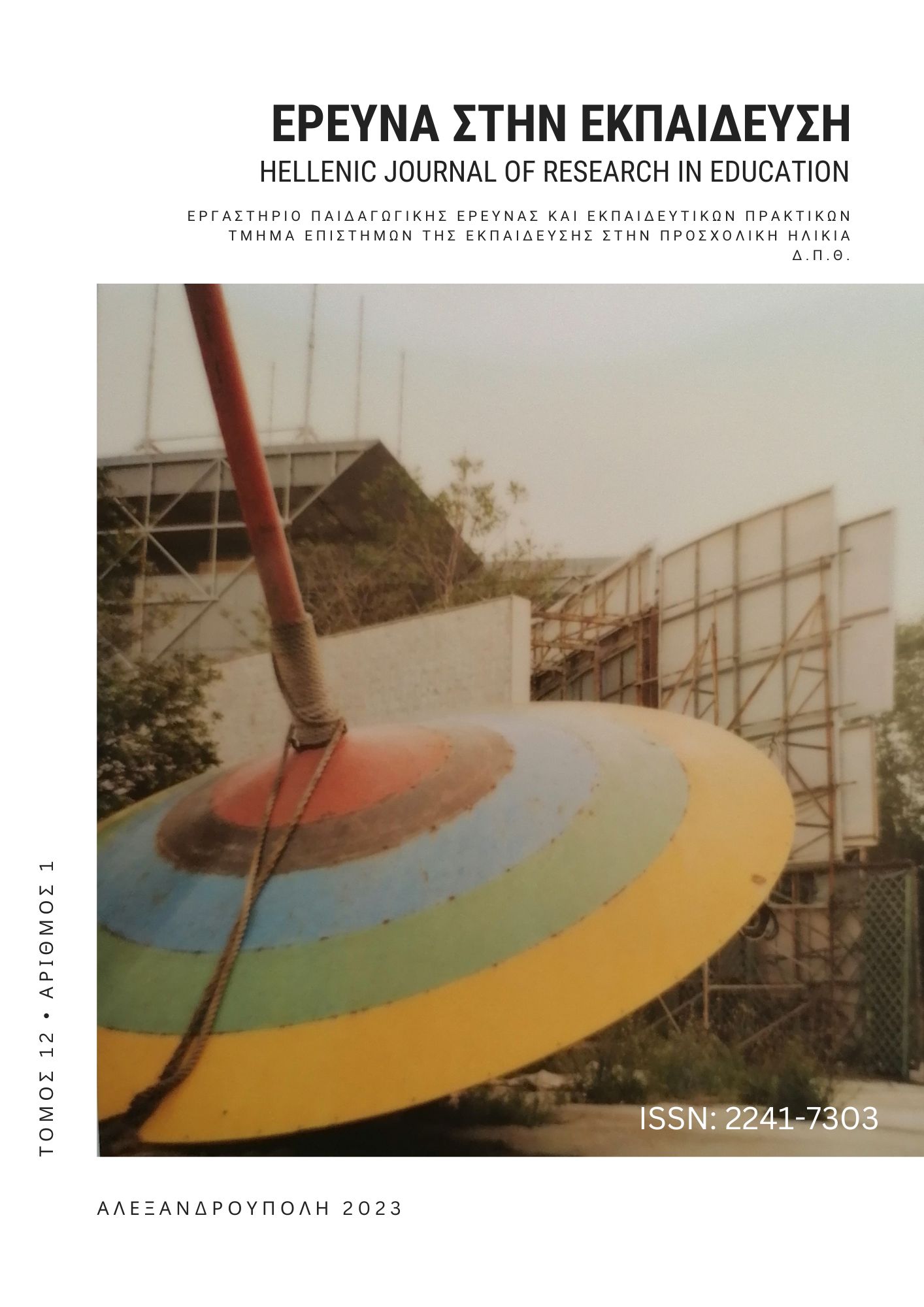Μεντορική σχέση στην Πρακτική Άσκηση και ψυχοσυναισθηματική βελτίωση υποψήφιων εκπαιδευτικών

Περίληψη
Στο άρθρο διερευνάται η ποιότητα των μεντορικών σχέσεων μεταξύ υποψήφιων εκπαιδευτικών και Μεντόρων, όπως αυτές αναπτύχθηκαν μέσω Μεντορικής Καθοδήγησης (mentoring) κατά το διάστημα εφαρμογής ενός ετήσιου προγράμματος Πρακτικής Άσκησης σε πραγματικό περιβάλλον σχολείου, και η επίδραση αυτών των μεντορικών σχέσεων στο πεδίο της ψυχοσυναισθηματικής βελτίωσης των υποψήφιων εκπαιδευτικών. Διενεργήθηκε ποιοτική έρευνα μελέτης περίπτωσης κατά το διάστημα από τον Οκτώβριο του 2021 μέχρι τον Μάιο του 2022, σε δύο χρονικές φάσεις (Οκτώβριος-Ιανουάριος, Μάρτιος-Μάιος). Στην έρευνα συμμετείχαν 77 υποψήφιοι/ες εκπαιδευτικοί, φοιτητές/τριες στο Τμήμα Θεολογίας του Εθνικού και Καποδιστριακού Πανεπιστημίου Αθηνών. Ερευνήθηκαν οι αντιλήψεις των υποψήφιων εκπαιδευτικών για τη μορφή της μεντορικής σχέσης που αναπτύσσεται στα μεντορικά ζεύγη στο πλαίσιο της Πρακτικής Άσκησης, τα αποτελέσματα από την εκπαίδευση των φοιτητών/τριών στο πεδίο της ψυχοσυναισθηματικής τους βελτίωσης και της καλλιέργειας της διδακτικής τους αυτοαποτελεσματικότητας, όπως επίσης και η επίδραση της μεντορικής σχέσης στην ανάδειξη των συγκεκριμένων αποτελεσμάτων. Και στις δύο φάσεις της έρευνας έγινε ταυτόχρονη χρήση ποιοτικών (τεχνική της «Πιο Σημαντικής Αλλαγής», ομάδες εστίασης) αλλά και ποσοτικών ερευνητικών εργαλείων (ερωτηματολόγιο αξιολόγησης της ποιότητας της μεντορικής σχέσης, ερωτηματολόγιο μέτρησης της διδακτικής αυτοαποτελεσματικότητας), έτσι ώστε να διερευνηθούν τριγωνικά τα υπό εξέταση ερωτήματα. Εφαρμόστηκε ανάλυση περιεχομένου και θεματική ανάλυση, όσον αφορά στα δεδομένα που αντλήθηκαν από τα ποιοτικά ερευνητικά εργαλεία, και αξιοποίηση περιγραφικής και επαγωγικής στατιστικής ανάλυσης (SPSS) για τα ποσοτικά δεδομένα των ερωτηματολογίων. Τα αποτελέσματα έδειξαν ότι κατά τη διάρκεια της Πρακτικής Άσκησης που εφαρμόζεται μέσω Μεντορικής Καθοδήγησης σημειώνεται εμφανής βελτίωση στην ψυχοσυναισθηματική κατάσταση και τη διδακτική αυτοαποτελεσματικότητα των υποψήφιων εκπαιδευτικών. Σε αυτό συντελεί η μορφή της μεντορικής σχέσης και συγκεκριμένα η επικοινωνία και η εμπιστοσύνη που αναπτύσσονται μέσα στα μεντορικά ζευγάρια. Τα παραπάνω έχουν ιδιαίτερη επιστημονική βαρύτητα σε συμφωνία με τη διεθνή βιβλιογραφία και μπορούν να αξιοποιηθούν στο επίπεδο του σχεδιασμού και της εφαρμογής παρόμοιων προγραμμάτων Πρακτικής Άσκησης νέων ή υποψήφιων εκπαιδευτικών μέσω Μεντορικής Καθοδήγησης.
Λεπτομέρειες άρθρου
- Πώς να δημιουργήσετε Αναφορές
-
Παπαϊωάννου Μ. (2025). Μεντορική σχέση στην Πρακτική Άσκηση και ψυχοσυναισθηματική βελτίωση υποψήφιων εκπαιδευτικών. Έρευνα στην Εκπαίδευση, 14(1), 52–69. https://doi.org/10.12681/hjre.40494
- Τεύχος
- Τόμ. 14 Αρ. 1 (2025)
- Ενότητα
- Άρθρα

Αυτή η εργασία είναι αδειοδοτημένη υπό το CC Αναφορά Δημιουργού – Μη Εμπορική Χρήση – Παρόμοια Διανομή 4.0.
Τα πνευματικά δικαιώματα των άρθρων του περιοδικού ανήκουν στους συγγραφείς. Τα άρθρα διατίθενται με άδειες Creative Commons CC-BC-SA 4.0




